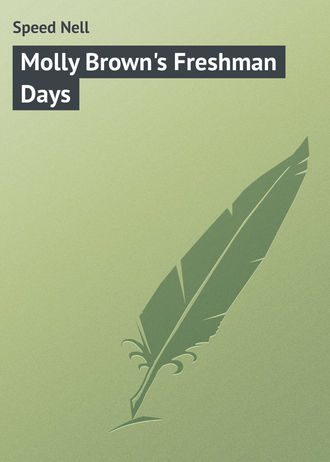 полная версия
полная версияMolly Brown's Freshman Days
Judy couldn’t make out why Judith Blount looked so white and uneasy when she entered the room; nor why her expression changed to one of intense relief a moment later.
“I came to ask you,” began Judy abruptly, “if any one had found your emerald ring.”
“Miss Brown has my ring,” answered Judith promptly.
“Didn’t you know that Molly had fainted and is now ill in the hospital and the ring is lost?”
“My emerald ring lost?” Judith almost shouted.
“Don’t carry on so about it,” put in Judy. “It’ll be found. Molly herself was up at dawn this morning. She stole away before anybody could stop her, and went to the field to look for it, but she hasn’t been able to find it, and neither has Nance, who looked for it later. Nance has gone down to the village to find the surrey that took Molly home. We are all doing everything we can and in the meantime I thought I would tell you so that you could help us.”
Judy could be very impudent when she wanted to, and she was impudent now, as she stood looking straight into Judith’s angry black eyes.
“She should have been more careful,” burst out Judith in a rage. “How do I know that – ” she stopped, frightened at what she was about to say.
“Better not say that,” said Judy calmly. “It simply wouldn’t go, you know, and you must know as well as I do that it would be absolutely false.”
“How do you know what I was going to say?”
“I could guess,” said Judy, shrugging her shoulders. “I can often guess things you would like to say, but don’t, Miss Blount. What I came for was to ask you to help us find the ring. Molly is very ill, and, of course, it’s the loss of the ring as much as anything else that’s made her so. We’re all doing the best we can, and if you’ll just kindly add your efforts to ours, it might help some.”
“Supposing the ring isn’t found, what redress have I? It’s been in our family for generations. It was brought over from France by a Huguenot ancestor – ”
“Nice place to be wearing it, then, at a football game!” exclaimed Judy indignantly. “And then forcing other people to take charge of it for you! Redress, indeed! Do you want Molly to pay you for your ring? I tell you, Miss Blount, that a person who really had Huguenot ancestors would never have suggested such a thing. It wouldn’t have been Huguenot etiquette.”
And Judy flung herself out of the room and down the steps before the astonished Judith had time to realize that she had been insulted by an upstart of a freshman.
It looked very much for a day or two as if Molly were going to have a congestion in one lung. For several days she was a very sick girl. She had a strange delirium that she was looking for something while she was walking on stilts. Many times she asked the nurse if sapphires were as valuable as emeralds, and once she demanded to know if an emerald as large as her little finger nail was worth much money, say, two acres of good orchard land. But the lung was not congested, as Dr. McLean had at first thought. In a day or two the fever subsided and by Thursday she was able to sit up in bed, propped by many pillows and see Judy and Nance.
Her room was a bower of flowers. They had even come from Exmoor, Lawrence Upton having sent her a box of lovely pink roses. Mrs. McLean had brought her a bunch of red berries from the woods, and one day two cards were brought up, one of which looked familiar: Miss Grace Green and Mr. Edwin Green, inquiring as to the improvement in Miss Molly Brown’s condition, were pleased to hear that she was better.
And now Nance and Judy sat on either side the young invalid, each trying to assume a cheerful expression and each feeling that whatever disagreeable things had happened – and several had happened – they must be hidden from Molly at all costs.
Judith Blount had scattered reports around college of an extremely hateful character which Molly’s friends had done their best to suppress. The ring had never been found, although everything had been done that could be thought of in the way of advertising and searching.
Moreover, Miss Steel had asked twice of Molly’s condition in a very meaning tone of voice, and had wished to know exactly when the nurse thought Molly would be able to see visitors. These things the girls knew, and since Molly was still weak and very hoarse, her friends were careful to keep off dangerous subjects.
Strange to say, Molly had never mentioned the ring to any one since she had been in the hospital.
“Everybody has been so beautifully kind,” she was saying, “and really, I think the rest is going to do me so much good, that when I get well I’ll be better than I was before I got sick,” she added, laughing.
“We’ve missed you terribly,” said Nance dolefully.
“Queen’s just a dead old hole without you, Molly, dear,” went on Judy affectionately.
Molly smiled lovingly at her two friends.
“You are the dearest – ” she began, taking a hand of each when the nurse entered.
“Miss Stewart would like to see you, Miss Brown.”
“Oh, yes,” cried Molly; “do ask her to come up.”
Nance and Judy did not linger after Mary Stewart’s arrival. Her face also wore a serious look, and she took Molly’s hand and gazed down into her face almost with a compassionate expression.
“How are you, Molly, dear?”
“Oh, I’m much better,” replied Molly, cheerfully. “I shall be up by to-morrow, the doctor says, and I expect to go back to Queen’s Sunday.”
Mary sat down and drew her chair up close to the little white bed.
“It’s almost providential my being in the hospital like this,” went on Molly, “it’s rested me so. You see, I was terribly worried about something when I came here.”
“And you aren’t worried any longer?”
“No; I’ve conquered it. I know it’s got to be faced; but I believe there will be a way out of it, and I’m not frightened any more. I have always had a kind of blind faith like that when things look very black.”
“You are talking of the emerald ring, aren’t you, Molly?”
“Yes, Mary. I know it hasn’t been found, of course. I can tell that by the girls’ faces, and I know that Judith Blount is – well, she is your friend, Mary – ”
“Oh, no; not now,” put in Mary. “We’ve had a – er – difference of opinion that has – well, not to put too fine a point on it, broken up our friendship. I always admired her, without ever really liking her.”
Molly looked at Mary and a very tender expression came into her heavenly blue eyes.
“Was the difference about me?” she asked presently.
Mary hesitated.
“Yes, Molly; since you force me to tell you, it was.”
“She has been saying some horrid things? Of course, I knew she would. I was prepared for that. And I could tell – ” Molly paused. “No, no, I mustn’t!” she exclaimed hastily.
“What could you tell, Molly?”
“Don’t ask me. I would never speak to myself again, if I did tell. She has been saying that I never lost the ring, that I was poor and needed the money, and things like that. Tell me honestly, isn’t that the truth?”
Mary nodded her head and frowned. There was a silence, and presently Mary’s strong, brown fingers closed over Molly’s slender ones.
“Molly,” she began in a business-like tone of voice, “I’m almost glad that this subject has come up because I came here really to – ” she broke off. “It’s very hard,” she began again. “I hardly know how to put it. You knew, Molly, dear, that I was rich, didn’t you?”
“Why, yes; I guessed you must be, although you have been careful not to mention it yourself. You’re the most high-bred, finest girl I ever knew, Mary,” she added impetuously.
Mary laughed.
“That’s nice of you to say such things, dear, because I haven’t but one ancestor on my paternal side and that’s father, but he’s generations in himself, he’s so splendid. But to go on, Molly, dear, I am rich, not ordinarily rich, but enormously, vastly rich. It’s absurd, really, because we’ll never spend it, and we don’t care a rap about saving it; but whatever father touches just turns to gold.”
“I wish he’d touch something for me,” laughed Molly, wistfully.
“Now, listen to me, dear, and don’t interrupt. Father adores me to that extent that I could spend any amount of money and he would just smile and say: ‘Go ahead, little Mary, go as far as you like.’ But, you see, I only want a few very nice things, consequently, I can’t be extravagant to save my life.”
Molly laughed aloud at this naïve confession.
“The point I’m coming to is this, Molly: Judith Blount is being exceedingly horrid over that ring. I believe myself it will be found eventually. But until it is found, I want you – now don’t interrupt me and don’t carry on, please – I want you to ask her the value of her old ring and give her the money for it. If she chooses to be ill-bred, she must be treated with ill-bred methods.”
“But, dearest Mary, I can’t – ” began Molly.
“Yes, you can. I haven’t known you but a few months, Molly, but I’ve learned to love you in that time. And when I really care for any one, which is seldom, she becomes a sister to me. You are my little sister, and shall always be. I shall never change. And between sisters there must be no foolish pride. Now, Molly, I want to settle this thing with Judith Blount once and for all, through you, of course. She is not to know I had anything to do with it. You must tell her that you have raised the money and would like to pay her the full value of the ring. When the ring is found, she can give you back the money. That will stop her wicked, wagging tongue, at least.”
Molly tried hard not to cry, but the tears welled up in her eyes and trickled down her cheeks. She took Mary’s hand and kissed it.
“I wish I could kiss you, dearest Mary,” she sobbed; “but you see, I’ve got such a bad cold.”
How could she thank Mary for her generous offer or explain that her family would never allow her to accept the money, even if she felt she could herself?
“You are the finest, noblest, most generous girl,” she went on brokenly.
“No, I’m not,” said Mary. “It’s easy to do things for people we love and easier still when we have the money to do it with. If I hadn’t been so fond of you, Molly, and had been obliged to deny myself besides, that would have been generosity. This is only a pleasure. A sort of self-gratification, because I’ve adopted you, you see, as my little sister.”
Molly lay quietly for a while with her cheek pressed against Mary’s hand.
“Are you thinking it over?” asked Mary at last, patting her cheek.
“I’m thinking how happy I am,” answered Molly.
“As soon as you are well, then,” went on Mary, rising to go, “you must have an interview with Judith and settle the whole thing.”
Molly smiled up at her friend and squeezed her hand.
There are times when two friends need not speak to express what they think.
“Even if I never win the three golden apples,” she reflected after Mary had gone, “I have won three friends that are as true as gold.”
CHAPTER XX
MISS STEEL
With the wonderful powers of recuperation which natures like Molly’s have, on Sunday morning she was up and dressed, almost dancing about her room in the infirmary, long before it was time for Dr. McLean to call and grant her permission to leave.
It was good to be up and well again; it was good to be at college, for she had been homesick for Wellington since she had been shut up in the hospital, and better still, it was good to have friends, such friends as she had.
As for the emerald ring – a shadow darkened her face. The thought of the emerald ring would push its way into her mind.
“I believe it will come out all right,” she said to herself. “I believe it – I believe it! I couldn’t help losing it, and if it isn’t found, I can’t help that, either. I just won’t be miserable, that’s all. I feel too happy and too well.”
“Are you at home to visitors this morning, Miss Brown?” asked a sharp unmusical voice at the door.
“Oh, yes; do come in,” answered Molly, rising to meet Miss Steel, who had walked up the uncarpeted steps and along the echoing corridor without making a sound, as usual.
Molly’s manners were unfailingly cordial to visitors, and when she shook hands with Miss Steel and insisted on making her take the armchair, that flint-like person visibly softened a little and faintly smiled. Molly wondered why the sanitary inspector had called on her, but she appreciated attentions from anybody and was as grateful for being popular as if it were something entirely new and strange to her.
She showed Miss Steel her flowers and pinned a lovely pink rose on the inspector’s granite-colored cloth coat. She made light of her illness, and rejoiced that she was returning in a few hours to dear old Queen’s. She was, in fact, so wonderfully sweet and charming that Sunday morning that it must have been very difficult even for the stony inspector to touch on the real business of her visit.
At last, however, Miss Steel buckled on her armor of decision, averted her eyes for a moment from Molly’s glowing face and plunged in.
“I don’t suppose, Miss Brown, you suspected my title of ‘Dormitory Inspector’ here was merely a nominal one, and that I had another motive in being at Wellington College?”
Molly hardly liked to tell her that they had long considered her a spy and detested her for that reason. She said nothing, therefore, and sat in her favorite position when listening intently with her hands clasping one knee and her shoulders drooping; a very wrong position indeed, considering that it would eventually make her round-shouldered and hollow chested; but Molly was never more graceful or comfortable than when she adopted this unhealthful attitude.
“I am an inspector,” went on the other, “but I am an inspector of police, that is, a detective. Doubtless you have heard of certain mysterious things that have happened at Wellington this autumn; the attempt to burn the gymnasium, which we now believe was only a practical joke to frighten the sophomore class; the cutting of the electric wires one night, and there are a few other things you have not heard; for instance, Miss Walker has received lately several anonymous letters – two of them about you – ”
Molly started.
“About me?” she exclaimed.
“Yes,” said Miss Steel, watching her closely. “But they were not disagreeable letters, strange to say, since anonymous letters usually are. They expressed the most ardent admiration for you. They mentioned that you had enemies who were trying to ruin your reputation.”
“How absurd!” exclaimed Molly indignantly. She detested anything deceitful and underhand with all her soul. “When did these letters come?”
“Just since you have been at the Infirmary.”
“They must be about the emerald ring,” broke in Molly.
“Exactly,” answered the inspector. “You have lost a valuable emerald ring belonging to another girl who is making it disagreeable for you.”
“But I didn’t want to take care of her ring,” protested Molly. “She insisted on it. It was too big for my finger, and when I fainted it must have slipped off. I’ve done everything I could to find it, but she needn’t worry. She’ll be paid for it, if two acres of good apple orchard that were to have paid my college expenses have to go.”
“Nonsense, child!” exclaimed Miss Steel, suddenly melting into a human being. “I’m going to find that ring for you if it takes the rest of this winter.”
Molly seized her hand joyfully. By one of those swift flashes of insight which come to us when we least expect them, it was revealed to Molly that she had made a friend of the inspector.
“I have been here almost a month,” continued Miss Steel, giving the girl’s hand a little vicelike squeeze, which was her way of expressing cordiality, “and I have found out a great many things. A girls’ college is a strange place. There is a good deal of wire-pulling and petty jealousy among a certain class of girls, and yet I have reason to know that the code of honor here is exceedingly high, and I find myself growing more and more interested in the girls and their lives. Nowhere but in college could such devoted friendships be formed. They are elevating and fine, especially for selfish girls, who learn how to be unselfish by example. The girls develop each other. Your G. F. Society, for instance, has had a remarkably refining and, shall I say, quieting effect on Miss Andrews – ”
Molly started. She was amazed at the inspector’s insight into the college life.
“Which brings me to the point I have been aiming to reach. Since I have been here I have taken pains to learn the history of Miss Andrews as well as to study her character. She is a strange girl. Doubtless you know the incident of last year?”
Molly shook her head.
“To begin at the beginning: Miss Andrews’ parents were rather strange people. Her father is a city politician who never made any secret of his grafting methods. Her mother was an actress and is dead. Frances hadn’t been brought up to any code of honor. She had been allowed to do as she chose, and had all the money she wanted to spend. If she is vulgar and pretentious, it isn’t really her fault. Last year she offended her class by telling a falsehood. She was under honor, according to the custom here when a student leaves the premises, to be back from some visit by ten o’clock Sunday night. She missed the ten o’clock train and took the train which arrived at midnight. However, as luck would have it, the ten o’clock train was delayed by a washout and drew into Wellington station just in front of the train Frances was on. She, of course, found this out immediately, and taking advantage of it, she gave out that she had been on the earlier train, which saved all unnecessary explanations. It must have been a great temptation for a girl brought up as she had been. But truth always comes to the top, sooner or later, and as the President of her own class happened to have been on the earlier train, she was found out. She was summoned by the Student Council, tried and found guilty. Then she was treated, I imagine, something in the same way that a French soldier is expelled from the army. Figuratively speaking, her sword was broken and her epaulettes torn from her uniform!”
“How terrible!” exclaimed Molly.
“Yes; it was pretty severe. But she was very defiant, and said dreadful things, denounced her class and college. Few girls would have had the courage to return to college next year, but she came back, hoping to live her dishonor down, and when she found her class to a member ignored her very existence, she became almost insane with bitterness and rage, and having studied her character closely, I judge that for a while, until your secret society took her in hand, she was hardly responsible for her actions.
“Now, Miss Walker is very sorry for Frances Andrews; but she considers her a dangerous element in college, and at mid-years she would like some definite reason for asking her not to come back. I am speaking plainly, because Miss Walker is convinced that you know a definite reason and through some mistaken idea of kindness, you keep it to yourself. In fact, Miss Brown, Miss Walker is convinced that you and you alone saw Frances Andrews cut the wires in the gymnasium that night.”
“But I didn’t,” cried Molly, much excited; “or, rather, it wasn’t Miss Andrews.”
Miss Steel looked at her in surprise, so sure was she that Molly would confirm her suspicions.
Molly sat down again and clasped her knees with her long arms. Her cheeks were crimson and her eyes blazing.
“Who was it, then?” asked the inspector.
“I can’t tell you that, Miss Steel. If I should give you the girl’s name I should be dishonored all my life. I have been brought up to believe that the one who tells is as low as the one who did the deed. When we were children, my mother would never listen to a telltale. I do think it was a wicked, mischievous thing to have done – a contemptible thing; but I’d rather you found out the name of the girl in some other way than through me, especially right now – ”
“Why right now?”
But Molly would not reply.
Miss Steel could see nothing but truth in the depths of Molly’s troubled blue eyes. She took the girl’s hand in her’s and looked at her gravely.
“You are a fine girl, Miss Brown,” she said, “and if you tell me that the girl who cut the wires was not Miss Andrews, I believe you implicitly. Of course, Miss Walker would never tell Miss Andrews not to return to Wellington without something very definite and tangible on which to base her dismissal. Luke Andrews, the girl’s father, is as hot-headed and high tempered as his daughter, and he would probably make a great deal of trouble and cause a great deal of publicity if Frances were asked to leave college quietly.”
“I’m sorry for her,” said Molly. “I think she might have been helped if she had had just a little more time. After all, the worse thing about her is her bringing up.”
“And this other girl whom you are shielding, Miss Brown, does she deserve so much generosity from you?”
Molly closed her lips firmly.
“That isn’t the question with me, Miss Steel,” she said at last. “The question is: could I ever show my face again if I told.”
“But no one need ever know, that is, no one but the President and me.”
“You don’t understand,” said Molly wearily. “It’s with me, you see. I could never be on comfortable terms with myself again. I should always be thinking that I hadn’t behaved – well, like a gentleman.”
Then the inspector did a most surprising thing. She went over and kissed Molly.
“I wouldn’t for worlds keep you from being true to yourself, my child,” she exclaimed. “It’s a rare quality, and one which will make you devoted friends all your life, because people will always know they can trust you.”
Molly looked at the inspector, and lo and behold, a strange transformation had taken place in that inscrutable, expressionless face. The cold gray eyes were softened by a mist of tears and the thin lips were actually quivering. She looked almost beautiful at that moment, and Molly suddenly put her arms around her neck and laid her head on the flat, hard chest.
“You’ll forgive me, won’t you, Miss Steel?”
“I will, indeed, dear,” answered the other, patting Molly’s cheek. “And now, don’t bother about all this business. Get well and strong. Don’t overwork, and I promise to find that ring for you if I have to turn the college upside down to do it.”
Then she gave Molly a warm, motherly squeeze, kissed her on the forehead and took her departure as quietly as she had come.
CHAPTER XXI
A BACHELOR’S POCKET
Miss Steel was a very busy woman that afternoon. She was shut up with Judy Kean for half an hour; she visited the livery stable in the village, she paid a call on Dr. McLean and finally she went to see Professor Green.
It is in Professor Green’s study on the Cloisters that we now find her, sitting bolt upright in her chair, alert and bright-eyed. At such times as this, Miss Steel is not unlike a hunting dog on the scent of his quarry.
Professor Green sits at his desk. He looks tired, and his heavy reddish eyebrows are drawn together in a frown. When the inspector came into the room he had pushed a pile of manuscript under some loose papers, but a sheet had slipped off and now lay in plain view. Across it was written in a bold hand:
“Exeunt FAIRIES in disorder, leaving WOOD SPRITE at Left Centre.
“THE SONG OF THE WOOD SPRITE.”
“I hope you will pardon this intrusion, Professor. I see you are very busy,” the inspector began, glancing at the manuscript with a look of some slight amusement.
The Professor hastily covered up the sheet.
“Not at all,” he said politely; “I’m just idling away a little time. What can I do for you?”
He had seen Miss Steel about the building and most of the Faculty knew her by this time as “Inspector of Dormitories.”
“Do you remember helping a young lady who fainted on the day of the football game?”
“Oh, yes, certainly,” replied the Professor, absent-mindedly fingering a paper cutter.
“You lent her your overcoat that afternoon, didn’t you?”
“Why, yes; I believe I did.”
“Have you worn the coat since?”
“Certainly,” he answered, laughing; “every day, and several times a day. It’s the only one I have. Are you a detective?”
“Yes. Do you ever put things in the pockets of your coat?”
The Professor smiled shamefacedly like a schoolboy culprit.









